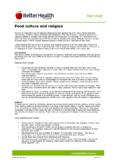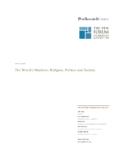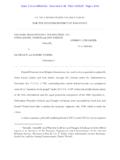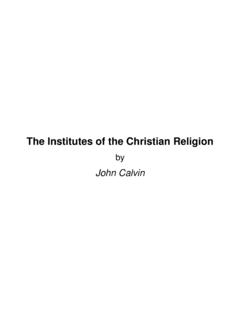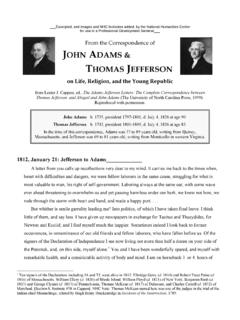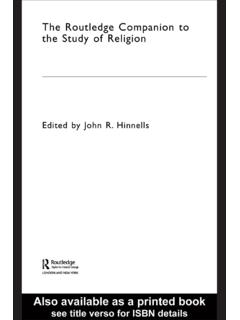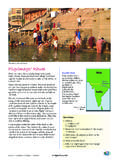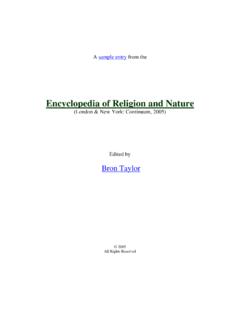Transcription of What is African Traditional Religion?
1 What is African Traditional religion ? by J. O. Awolalu*. Source: Studies in Comparative religion , Vol. 10, No. 2. (Spring, 1976). World Wisdom, Inc. religion is a fundamental, perhaps the most important, influence in the life of most Africans;. yet its essential principles are too often unknown to foreigners who thus make themselves constantly liable to misunderstand the African worldview and beliefs. religion enters into every aspect of the life of the Africans and it cannot be studied in isolation. Its study has to go hand-in- hand with the study of the people who practise the religion . When we speak of African Traditional religion , we mean the indigenous religious beliefs and practices of the Africans.
2 It is the religion which resulted from the sustaining faith held by the forebears of the present Africans, and which is being practised today in various forms and various shades and intensities by a very large number of Africans, including individuals who claim to be Muslims or Christians. We need to explain the word Traditional . This word means indigenous, that which is aboriginal or foundational, handed down from generation to generation, upheld and practised by Africans today. This is a heritage from the past, but treated not as a thing of the past but as that which connects the past with the present and the present with eternity. This is not a fossil . religion , a thing of the past or a dead religion .
3 It is a religion that is practised by living men and women. Through modern changes, the Traditional religion cannot remain intact but it is by no means extinct. The declared adherents of the indigenous religion are very conservative, resisting the influence of modernism heralded by the colonial era, including the introduction of Islam, Christianity, Western education and improved medical facilities. They cherish their tradition;. they worship with sincerity because their worship is quite meaningful to them; they hold tenaciously to their covenant that binds them together. We speak of religion in the singular. This is deliberate. We are not unconscious of the fact that Africa is a large continent with multitudes of nations who have complex cultures, innumerable languages and myriads of dialects.
4 But in spite of all these differences, there are *. Editorial Note: Dr. J. Omosade Awolalu is Senior Lecturer in the Department of Religious Studies, University of Ibadan, Nigeria, and has specialised in the field of the African Traditional religion . many basic similarities in the religious systems everywhere there is the concept of God (called by different names); there is also the concept of divinities and/or spirits as well as beliefs in the ancestral cult. Every locality may and does have its own local deities, its own festivals, its own name or names for the Supreme Being, but in essence the pattern is the same. There is that noticeable Africanness in the whole pattern.
5 Here we disagree with John Mbiti who chooses to speak of the religion in the plural because there are about one thousand African peoples (tribes), and each has its own religious system 1. Peculiarities of the religion This is a religion that is based mainly on oral transmission. It is not written on paper but in peoples hearts, minds, oral history, rituals, shrines and religious functions. It has no founders or reformers like Gautama the Buddha, Asoka, Christ, or Muhammad. It is not the religion of one hero. It has no missionaries, or even the desire to propagate the religion , or to proselytise. However, the adherents are loyal worshippers and, probably because of this, Africans who have their roots in the indigenous religion , find it difficult to sever connection with it.
6 Foreign Theorists and Investigators Before we had foreign investigators to give the world an idea of what the religious beliefs of the Africans looked like, there were theorists who have never been in Africa but who regarded it as the Dark Continent where people had no idea of God and where the Devil in all his abysmal, grotesque and forbidden features, armed to the teeth and with horns complete, held These theorists had fantastic tales to tell about Africa. And one such tale was recorded in a Berlin journal which Leo Frobenius read before he ever visited Africa to see things for himself. Among other things it said: Before the introduction of genuine faith and higher standards of culture by the Arabs, the natives had neither political organization nor strictly speaking any religion .
7 Therefore, in examining the pre-Muhammadan conditions of the negro races, to confine ourselves to the description of their crude fetishism, their brutal and often cannibal customs, their vulgar and repulsive idols and their squalid homes3. 1. J. S. Mbiti, African Religions and Philosophy, Heineman, 1969, 2. E. B. Idowu, African Traditional religion , , 1973, 3. Leo Frobenius, The Voice of Africa, Vol. 1, Hutchison, 1913, 2. And similar to this was the dialogue that took place between Edwin Smith, who had gone out as a missionary to Africa, and Emil Ludwig, an eminent biographer. When Ludwig got to know that Edwin Smith was in Africa as a missionary he was surprised; and in his surprise he asked, How can the untutored Africans comprehend God ?
8 Deity is a philosophical concept which savages are incapable of framing. 4. These two quotations show the ignorance, prejudice and pride of these theorists. They did not know, and they never confessed their ignorance about, Africa and the Africans. Hence Professor Idowu aptly describes this period as the period of ignorance and false certainty in the study of African Traditional But, as a contrast to these theorists, we have genuine seekers after truth who showed their doubts as to whether there could be any people anywhere in the world who were totally devoid of culture and religion , especially with particular reference to the knowledge of the living God. Prominent among such people were Andrew Lang, Archbishop N.
9 Soderblom,6 and Father Schmidt of Father Schmidt, for example, maintains: the belief in, and worship of, one supreme deity is universal among all really primitive peoples the high God is found among them all, not indeed everywhere in the same form or with the same vigour, but still everywhere prominently enough to make his dominant position indubitable. He is by no means a late development or traceable to Christian missionary influences. Father Schmidt had earlier been working among the Pigmies of the Congo in Central Africa. Such revelations and declarations succeeded in changing the attitude of the Western world concerning the religious beliefs of the so-called pre-literate peoples of the world.
10 At least, they raised doubts in the minds of those who might earlier have accepted the statements of the stay-at- home investigators and curio collectors. Thus, while there were some Western scholars attempting to write off Africa as a spiritual desert, there were, undoubtedly, a few who had the uneasy feeling that the story of a spiritual vacuum for a whole continent of peoples could not be entirely true. 8. While some scholars admitted that the whole of Africa could not be a spiritual vacuum, they raised doubt as to whether the God that the Africans believed in was the real God or their own 4. E. W. Smith, (ed.), African Ideas of God, Edinburgh, 1966, 5. See Idowu, African Traditional religion , 6.


